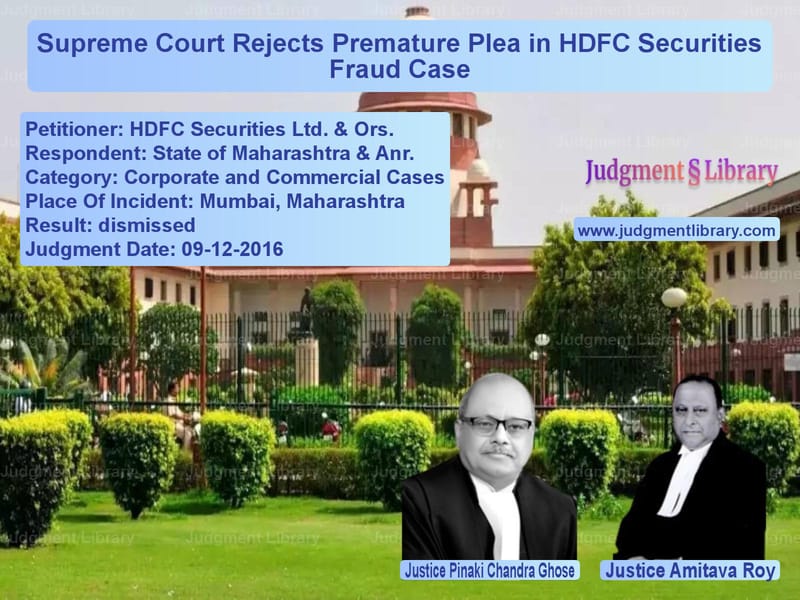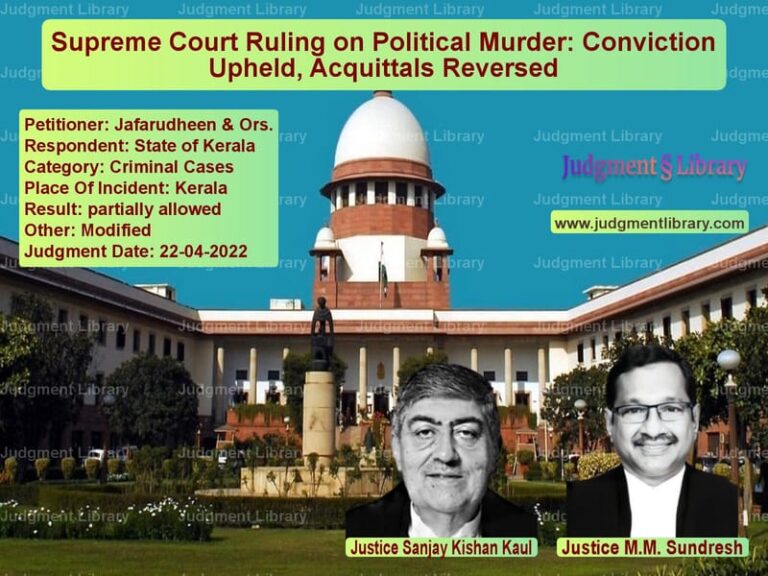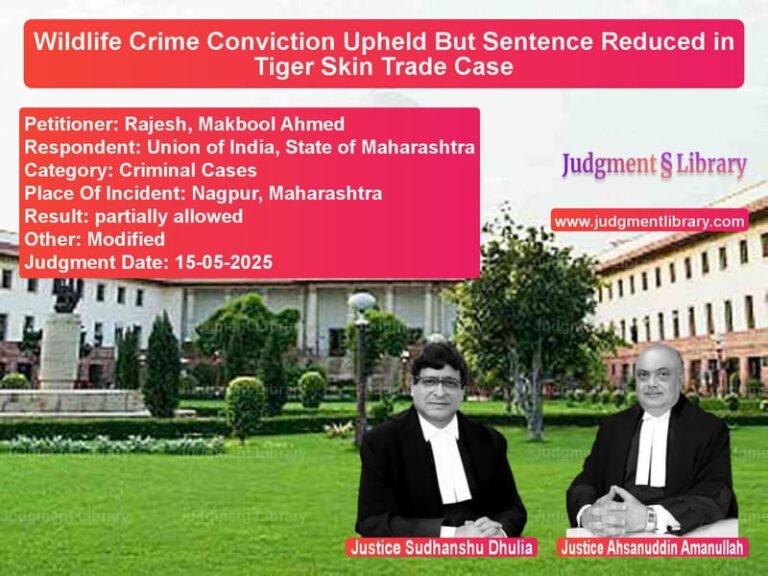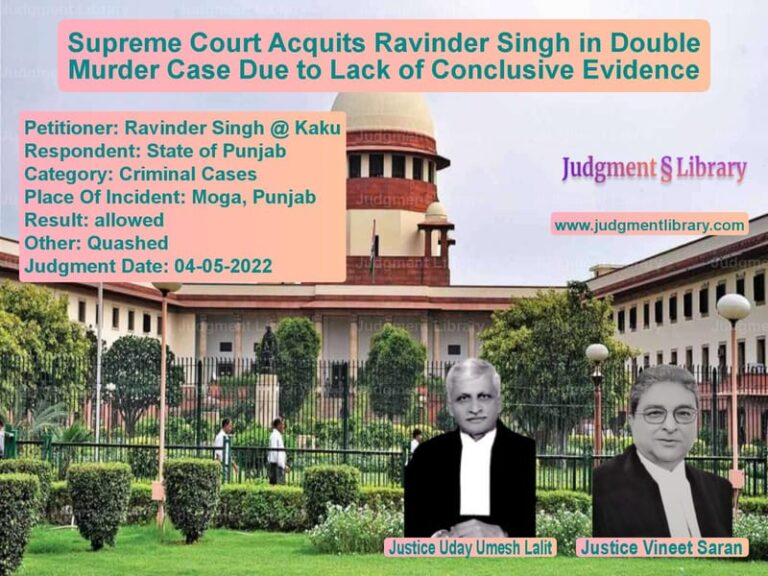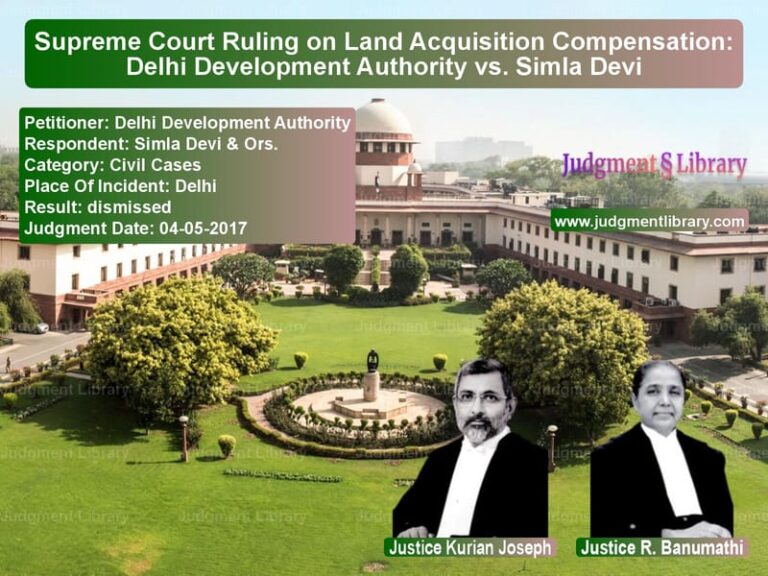Supreme Court Rejects Premature Plea in HDFC Securities Fraud Case
The case of HDFC Securities Ltd. & Ors. vs. State of Maharashtra & Anr. revolved around allegations of fraudulent trading and unauthorized transactions in a client’s account. The Supreme Court, in its judgment delivered on December 9, 2016, upheld the Bombay High Court’s decision, ruling that the criminal proceedings against the petitioners could not be quashed at a premature stage. The case provided clarity on the legal standards for initiating criminal investigations under Section 156(3) of the Cr.P.C.
Background of the Case
HDFC Securities Ltd. is a public company engaged in stock trading and investment services. The respondent, a customer of HDFC Securities, alleged that unauthorized and fraudulent trading had taken place in her account between July 2008 and June 2009, causing financial losses of approximately ₹70 lakhs.
The respondent filed a legal notice on August 3, 2009, demanding reimbursement for the alleged fraudulent activities conducted by the company’s Relationship Manager (RM), Vinod Koper. When her complaints were not addressed, she initiated arbitration proceedings before the National Stock Exchange (NSE) and later filed a criminal complaint under Section 156(3) of the Cr.P.C. before the Metropolitan Magistrate in Andheri, Mumbai.
The NSE arbitration panel ruled in favor of HDFC Securities on August 18, 2010, after finding that the respondent had authorized her husband to trade on her behalf. However, the respondent proceeded to file a criminal complaint, leading to an investigation by the Mumbai Police.
Key Legal Issues in Question
- Whether the Bombay High Court was correct in dismissing the writ petition challenging the FIR at a premature stage.
- Whether the allegations of unauthorized trading amounted to a cognizable offense under the Indian Penal Code (IPC).
- Whether the initiation of criminal proceedings constituted an abuse of process.
- Whether a contractual dispute over stock trading could be converted into a criminal case.
Petitioners’ (HDFC Securities & Ors.) Arguments
- The transactions were carried out with the respondent’s authorization and were confirmed through official trade communications.
- The arbitration tribunal had already ruled in favor of HDFC Securities, dismissing claims of unauthorized trading.
- The criminal complaint was filed with malicious intent, attempting to transform a civil dispute into a criminal matter.
- The FIR should be quashed as it was an abuse of process and based on fabricated allegations.
Respondents’ (State of Maharashtra & Customer) Arguments
- The complaint disclosed a cognizable offense under Sections 409, 420, 465, 467, 34, and 120B of the IPC.
- Criminal intent was evident as unauthorized trades were conducted without the respondent’s explicit approval.
- The arbitration proceedings dealt with contractual claims, but the criminal case was based on fraudulent activities, warranting independent investigation.
- The petitioners should not be granted relief at this stage as the investigation was still ongoing.
Supreme Court’s Judgment
The Supreme Court, comprising Justice Pinaki Chandra Ghose and Justice Amitava Roy, ruled against the petitioners, making the following key observations:
- The Bombay High Court was justified in dismissing the writ petition as it was filed at a premature stage.
- Criminal proceedings cannot be quashed before the completion of an investigation, especially when a magistrate has ordered an inquiry under Section 156(3) of the Cr.P.C.
- Allegations of fraud and criminal breach of trust must be investigated independently of civil arbitration proceedings.
- The order for police investigation did not cause irreparable harm to the petitioners and should be allowed to proceed.
- Vicarious liability under criminal law does not automatically apply to company officials unless specific allegations of misconduct are made.
Key Legal Takeaways
- Criminal vs. Civil Disputes: The ruling reaffirmed that allegations of fraud can be pursued separately from civil arbitration claims.
- Judicial Scrutiny of FIRs: Courts should be cautious in quashing FIRs before the investigation is completed.
- Company Liability: Corporate executives cannot be held vicariously liable unless clear evidence of direct involvement is presented.
- Due Process in Criminal Cases: Investigations initiated under Section 156(3) of the Cr.P.C. should not be interfered with prematurely.
Conclusion
The Supreme Court’s ruling in HDFC Securities Ltd. vs. State of Maharashtra sets a significant precedent for corporate fraud cases and the distinction between civil and criminal liability. The judgment ensures that financial fraud allegations are thoroughly investigated before courts intervene in quashing FIRs. This decision reinforces the importance of due process in criminal investigations while safeguarding against the misuse of legal remedies.
Don’t miss out on the full details! Download the complete judgment in PDF format below and gain valuable insights instantly!
Download Judgment: HDFC Securities Ltd. vs State of Maharashtra Supreme Court of India Judgment Dated 09-12-2016.pdf
Direct Downlaod Judgment: Direct downlaod this Judgment
See all petitions in Corporate Compliance
See all petitions in Judgment by Pinaki Chandra Ghose
See all petitions in Judgment by Amitava Roy
See all petitions in dismissed
See all petitions in supreme court of India judgments December 2016
See all petitions in 2016 judgments
See all posts in Corporate and Commercial Cases Category
See all allowed petitions in Corporate and Commercial Cases Category
See all Dismissed petitions in Corporate and Commercial Cases Category
See all partially allowed petitions in Corporate and Commercial Cases Category

